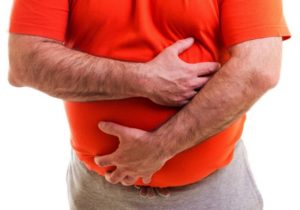
Dyspepsia is rather common condition among many, something that is characterized by indigestion or an upset stomach. It cannot quite be called a disease but a tricky issue that many of us often tend to suffer from, every once in a while, due to unhealthy or irregular eating habits and certain lifestyle issues.
Signs and Symptoms
The symptoms of dyspepsia usually range from bloating, belching, nausea and frequent burping to chest pain, heartburn, vomiting, black stools, difficulty breathing, perspiring and an apparent loss of appetite followed by weight loss. These symptoms are usually experienced either immediately after completing the meal, or sometimes after the food have been consumed, and the indications include a certain discomfort in and around the stomach and chest area.
How Dyspepsia Develops?
There are various reasons why one might suffer from dyspepsia in the first place, but the problem can largely be attributed to various unhealthy lifestyle habits, especially smoking and consumption of alcohol as has been observed in a majority of cases. Besides, eating too much and/or too quickly, consuming foods that are more oily, fried or spicy, excessive consumption of aerated beverages, over indulging in caffeine or chocolate based products, etc. can also wreak havoc on our digestive system. Some people may also be prone to dyspepsia due to consumption of a certain type of medication, such as over-the-counter antibiotics, anti-inflammatory drugs or regular NSAIDs (pain killers). Basically, it could be caused by anything that prevents our stomach from easily and conveniently taking-in and digesting the food that we are consuming. Besides, those individuals who are already suffering from digestive conditions or similar problems such as gastritis, hernia, gallstones, peptic ulcers, stomach cancer or even obesity are, in fact, more prone to the malady of dyspepsia.
Dyspepsia Is Common Issue
It is believed that when the hydrochloric acid in the stomach breaks down the mucosa (which is the delicate protective sheath of our digestive system), it tends to break it apart; thus leading to irritation and a significant discomfort around the region of the upper abdomen / stomach area. Dyspepsia is becoming a common problem among people from all walks of life, especially those following a rather sedentary lifestyle. There is no age bar to those suffering from this condition and people from either of the genders may experience the malady.
Is Dyspepsia Curable?
Dyspepsia is largely curable and not something we have-to suffer- from every once in a while. It is all about how much our body can take, and should be allowed to take. You need to make some diet and lifestyle modifications and treat it with what’s good and healthy for your body and this shall return the favour.
Diet Recommendations for Dyspepsia
There are some natural home remedies that can relieve the condition to quite an extent.
- For those of us who often suffer from this gastrointestinal problem, including fresh and seasonal fruits such as orange, apple, pineapple, melon, grapes, pear and pomegranate etc. go a long way in providing relief.
- Other than this, it is given that we should eat light foods that contain minimum of oil and spices.
- Some food items often serve as a trigger to dyspepsia. You need to cut down on caffeine based products, chocolates, spicy/oily foods and especially those junk food items such as burger, pizza, bread, etc.
- Do not eat heavy meals in one go. Keep your meals light, and break them into small intervals. Have something healthy to munch on every once in a while, let your body digest it before you fill it up any further.
- Also, late night munching is a big no-no, especially if you are prone to dyspepsia.
- Adding items such as ginger, garlic, Aloe vera, freshly prepared cottage cheese, buttermilk and yogurt etc. are healthy as well as incredibly healing when it comes to dyspepsia.
- Ginger, especially, is known to help move the along from stomach to the small intestine, thus relieving us of all the bloating and indigestion.
Lifestyle Modification Tips
By making slight lifestyle modifications, we could actually prevent and also relieve the discomforting onset of dyspepsia to a great extent.
- Quit smoking and alcohol altogether.
- Eat few (at least three) hours before you hit the bed at night, since it is not advisable to lie down immediately after having consumed a meal.
- You need to wear comfortable clothes that are loose and light around the stomach area.
- Take a walk after dinner and allow the food to be digested a little before you call it the day.
- Avoid taking over the counter drugs. Only use the ones that have been prescribed by a doctor that you trust.
- Get active and involve yourself in a workout regimen that suits you best. You will feel better, and of course, your digestive system will thank you for it.
- Engage yourself in activities that help reduce daily stress and avoid situations that make you experience any kind of emotional suffering.
Watch Video: Best Natural Ayurvedic Remedies for Indigestion & Gas Problem
About the Author:
Dr Sonica Krishan is Author and Speaker in the areas of Healthy and Joyous Living through Ayurveda, Meditation, Yoga and other Contemplative practices. She is a leading Ayurveda Professional in India. She is also Health Writer, Columnist, Editor, Ayurveda Consultant and Holistic Healing Coach. Dr Sonica is open for National as well as International Collaborations with interested people / institutions in fields of Ayurveda, Meditation and Yoga.
EFFECTIVE AYURVEDA TIPS FOR BOOSTING DIGESTION
